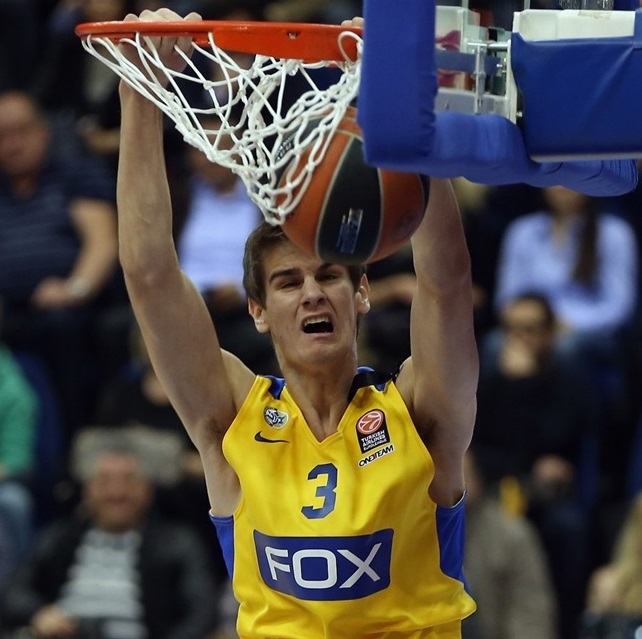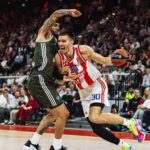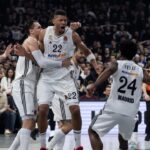
He was one of the most discussed European draft prospects ever. Now that he’s begun his life in the NBA, what can we expect from Dragan Bender? Emmet Ryan examines the challenge ahead for the young Croatian with experts from both sides of the pond
The Phoenix Suns haven’t exactly been much to talk about in the early going of the NBA season, still winless at the time of writing and on everyone’s list to be back in the lottery next summer. In theory, that situation should present Dragan Bender with more opportunities than last season. Throughout most of last season he rode the bench at Maccabi Tel Aviv, a traditional power in Israel and Euroleague that was suffering an annus horribilis.
With limited minutes, development was a question and it was one noted by those observing him up close in person. Moshe Barda, an Israeli journalist with Teamscout, saw plenty of Bender’s action, or rather inaction, at Maccabi. While the lack of playing time was an issue, the struggle could stand to Bender long-term.
“This struck the surface quite a lot during last year, and sure enough there were those who claimed it was a mistake [to call him up to the first team] and those that claimed it wasn’t. I think the best way to look at it is by looking at the bottom line, meaning in what ways did last year contributed to him?”
“It’s true that he could have gotten much more playing time should he have played in the ABA league, but the truth of matter is that he also evolved his game in Maccabi which was visible in terms of not getting stuck under the rim. He also improved his perimeter defensive close-outs etc. Being in Tel Aviv away from home and more especially playing at times in ‘hostile’ environments (such as a sold out crowd in Jerusalem) and putting up good numbers have definitely showed how much he matured during that season, something that might not have happened if he were to play outside Maccabi.”
“He gained all sorts of experience. You have to understand that Dragan had here a personal trainer and was closely monitored throughout the year.”
From watching Bender in action with Maccabi, even in limited time, Barda got to see his development before going to the association.
“He has good shooting mechanics, though at times he wasn’t consistent and his mid-range shot still needs work. He definitely showed he can score in various ways, while moving without the ball, can slash to a certain extent, can shoot from deep, he runs the court really well in transition, he can pass the ball both on fast breaks and on set offense (from the post and into) has a high basketball IQ,” said Barda.
“On defence can contest shots thanks to his length which he also uses to keep plays alive (on offence), he can definitely block shots (just ask Gentile and Stanko Barac- they know…..), his downsides were obvious and visible because of his young age and his thin frame (hasn’t stopped growing). He needs to bulk up or simply get stronger (a matter of time). He may be gifted offensive weapon but needed to be more consistent while also improving his shooting stroke specifically high post,”
“To fully understand Dragan’s potential, we have to go back to the 2015/16 preseason games vs Milan that were held on American soil, where he gave everyone a small taste of who he is while sparking the imagination of everyone regarding what he can become,”
“Dragan has great potential in the NBA, and that’s because of his remarkable physical attributes. Just think about it he is an extremely mobile and fluid 7’2′ kid with a 7’2′ wingspan that can run the court very well, adding to that great length with a 9’3′ standing reach which is also used for shot contesting\blocking, has good court vision he can pass the ball he can dribble, he can shoot, he can be used in various positions, safe to say that this Diamond’s cut is getting clearer and clearer. And the fact that the game is more spaced in the NBA can help him make an impact in his rookie season,”
“I had the chance to watch Dragan playing in the second division team two seasons ago. When he landed in Israel for the 2015-16 season he looked taller and as it later turned out he really was, so realizing he was still (and maybe still is) growing was remarkable and scary (overwhelming might be more suitable) at the same time since his physical attributes were already amazing as it is.”
The potential Barda points to is easy to find appealing, and it’s no shock he went high in last June’s draft, but that’s no guarantee of getting an opportunity in the league. Bender is from a generation of Europeans who come over without the exotic tag. Teams aren’t looking for diamonds in the rough here anymore, they are looking for players who can develop into stars. It’s not different to what they look for in the NCAA scene, as…making his first return to BiE in years…our editor emeritus Os Davis explains.
“At this point, Europeans in the NBA should no longer be regarded as a separate group; as the American and European styles continue to greater and greater resemble each other in both gameplay style and desired skill sets, guys like Bender should no longer be regarded as, say, ‘the top Croatian/European in this draft class’ and rather ‘the no. 4 overall pick in this draft class’,” said Davis.
“Having said that, Bender appears to bring skills worthy of the high lottery positon at which he was drafted. The Suns reportedly believe Bender will contribute immediately and often, but he’s not penciled in as a starter,”
Like Barda, Davis doesn’t seen Bender’s relative inactivity last season as a major obstacle to him with the Suns.
“To be honest, I’ve never understood the lack of concern for playing time in a professional league before joining the NBA. A prime example: Brandon Jennings forewent a freshman year of college (where he might have played 35 minutes a game as a starter) to play for Roma, where he was 8th or 9th man and averaged 17 minutes a game in playing time. He was nevertheless still drafted 10th overall by the Milwaukee Bucks,” said Davis.
“As a fellow lottery pick, Bender is in a similar situation – except of course all his development was in Croatia and Europe. But hey, if the NBA scouts aren’t worried about playing time in a European pro league, why should I (or Phoenix Suns fans)?”
For Davis, the bigger concern is getting used to the way D is played in the association. It’s an area where Bender needs a lot of work.
“He’s gonna have to adapt to NBA-style defence *fast*: The Suns were down near the bottom of the table in most defensive metrics last season, and they’ll surely seek to improve on this to compete in an ever-more ridiculously stacked Western Conference,” said Davis.
“He’ll also be called on to play some power forward, with very little rebounding apparent on this roster. The starting frontcourt of Tyson Chandler, Jared Dudley and P.J. Tucker, combined for just 18.4 board per game last season. Off the bench, the rebounds will come from … well, that’s the problem for Bender and Suns management to address,”
“Also under that ‘should’ category comes the inevitable upper-body strength conditioning. I can’t think of the last Euorpean to come down the NBA pike who was *not* declared to need upper-body work – particularly in moving from a no. 4 to a no. 5 as Bender will be called upon to do – and, uh, yeah, I’d have to admit that Bender could probably use a little more poundage (or kiloage).
Having played less than 8 minutes a night to open the season, Bender is being eased in slowly with Phoenix. Davis said the size of the Croatian’s role this year is going depend a lot on what happens elsewhere on the roster.
“Bender could well start the season as first off the bench, depending on the patience coach Earl Watson has for Tucker, who was erratic at best last season. It’s almost guaranteed that Suns fans will become well familiar with Mr Bender before season’s end due to the general lack of depth here. This Suns are definitely in rebuilding mode, and the minutes should be there for Bender.”





Leave a Reply